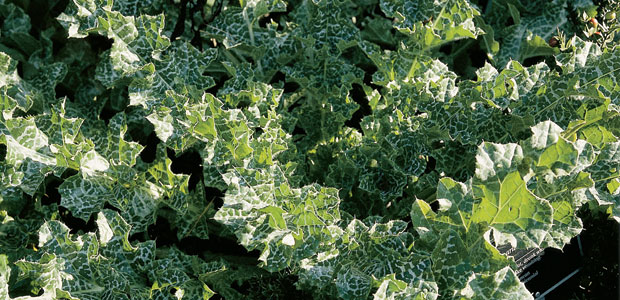Advertisement
Milk Thistle
For hundreds of years, medicinal plants have been used to protect and support liver function. Of these, the best known and currently the most well-researched is milk thistle (Silybum marianum), a rather ominous looking plant covered in sharp spines pointing in all directions. But don’t let its prickly appearance fool you–milk thistle has an impressive … Continued

For hundreds of years, medicinal plants have been used to protect and support liver function. Of these, the best known and currently the most well-researched is milk thistle (Silybum marianum), a rather ominous looking plant covered in sharp spines pointing in all directions.
But don’t let its prickly appearance fool you–milk thistle has an impressive reputation for protecting the liver against many types of damage while helping to regenerate healthy new liver cells.
The Defender
Scientific studies and clinical trials over the last 40 years, together with its historical use as a liver tonic, have shown that milk thistle protects the liver against acute and chronic viral hepatitis, cirrhosis, harmful environmental chemicals like carbon tetrachloride, toxins in our food and water, long-term alcohol consumption, and prolonged use of over-the-counter and prescription medications and hormones. Milk thistle is especially useful for people living or working around areas of industrial pollution, radiation, hydrocarbon emissions, and contaminated water supplies.
The hepatoprotective (liver protective) flavonolignans, known collectively as silymarin, are contained primarily in the seeds of the plant. These active constituents can alter cell membranes so that only small amounts of toxins can penetrate liver cells. Milk thistle protects and increases glutathione levels in the body; glutathione destroys harmful peroxides and free radicals. Silymarin helps increase hepatocyte protein synthesis–a process in which cells produce proteins that are essential for the regeneration and repair of liver cells–but without stimulating malignant liver tissue.
The seeds also contain betaine and essential fatty acids that may exert an anti-inflammatory effect on liver tissues by inhibiting the formation of liver-damaging leukotrienes (active compounds produced by the body during inflammatory responses). Silymarin normalizes immune function, and its antioxidant activity is reported to be more powerful that vitamin E.
Amanita Antidote
An extraordinary use of milk thistle is as an antidote for death cap mushroom (Amanita phalloides) poisoning. The Amanita genus is widespread and has several edible species. Unfortunately, the genus also contains some highly toxic mushrooms that result in about 60 cases of poisonings every year. Accidental ingestion results in severe liver damage and a mortality rate of about 30 percent. However, if treated within 10 minutes of ingestion, one study showed the liver protective action of silymarin counteracted the Amanita toxins; if treated within 24 hours, all patients survived and permanent damage to the liver was prevented.
Super Silymarin
In 2003 the Journal of Alternative and Complementary Medicine published a paper proposing that milk thistle may be effective in safeguarding liver function from toxicity during chemotherapy. It is thought that the same beneficial effect of silymarin that hinders toxins from entering cell membranes may also protect the liver and kidneys of patients who are undergoing anticancer treatment. Preliminary research also suggests that milk thistle may enhance the tumour-fighting effects of certain chemotherapy medications.
Many professional herbalists recommend milk thistle as a liver decongestant to stimulate the flow of bile through the liver and gallbladder. This improves digestion and can prevent the formation of gallstones and bile-induced liver damage. Milk thistle is also safe to use by breast-feeding mothers to promote milk secretion. In addition, the positive effect of silymarin on the liver’s ability to filter and detoxify is of value in the treatment of psoriasis. While further studies are needed, milk thistle has been shown to be beneficial in lowering LDL, the “bad” cholesterol, and increasing HDL, the “good” cholesterol.
Milk thistle extract can be taken long term and has no known side effects. Extracts are usually standardized to contain 70 to 80 percent of the active silymarin, and the suggested adult dose is generally 140 mg, three times daily. Research has shown that a new, more potent form of silymarin that is bound to phosphatidylcholine, a key element of cell membranes, delivers more silymarin to the liver and gallbladder, increases its absorption and bioavailability, and improves the solubility of bile. The recommended dosage for adults is 100 to 200 mg, twice a day.
If your diet is high in processed foods or you are regularly exposed to toxic substances, have a family history of liver disease, or over-indulge in alcohol, milk thistle can help you protect, restore, and maintain healthy liver function.




